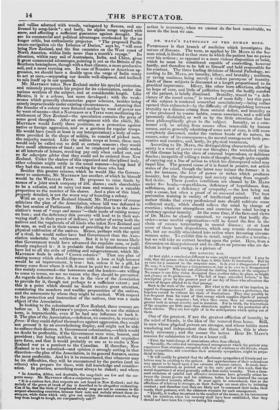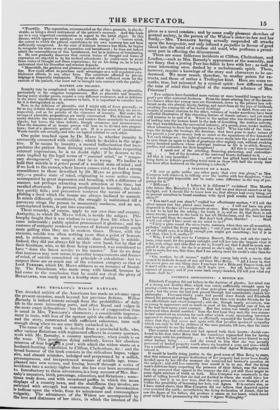PATHOLOGY is that branch of medicine which investigates the nature
of diseases. The term, as applied by Dr. MAYO to the hu- man mind, is limited to that state in which the patient has no power over his actions ; as opposed to a mere vicious disposition or habit, which he must be considered capable of controlling, however hardly, and therefore to be left to himself and held responsible for his conduct. The three leading divisions of Mental Pathology, ac- cording to Dr. MAYO, are insanity, idiocy, and brutality ; madness, or raving madness, being merely a violent paroxysm of insanity. Each of these subjects is discussed at a length proportioned to its practical importance. Idiocy, like other born affections, allowing no hope of' cure, and little of palliation beyond the bodily comfort of the patient, is briefly dismissed. Brutality, traced to " a defi- ciency of the moral sense," is treated of more fully : but this part of the subject is rendered somewhat unsatisfactory—being rather opened than exhausted—by the difficulty of distinguishing between brutality as a disease arising from natural defect, and brutality as a vice produced by coarse habits, coarse associates, and a self-will ignorantly disdainful, as well as by the little attention that has been philosophically given to the subject. Insanity, as a com- moner evil, as arising from causes often removable by human means, and as generally admitting of some sort of cure, is still more completely discussed, under the various heads of its nature, its causes, some of its consequences, its mental management both pre- ventive and curative, and, lastly, its physical treatment. According to Dr. MAYO, the distinguishing characteristic of in- sanity is a want of power over our thoughts ; the wretched victim of this disease being the slave of external impressions, or delirious fancies ; incapable of willing a train of thought, though quite capable of carrying out a line of action to which his distempered mind may impel him. The general cause of it is found in passive, not active states of' the mind, though the latter may induce the former : it is not, for instance, the love of power or riches which produces insanity, but the despondency and anxiety arising from ungrati-
fied desire. These passive conditions are classed by Dr. MAYO under five heads,—regretfulness, deficiency of hopefulness, fear,
selfishness, and a deficiency of sympathy, — the last being not only a cause, but often a proof of an unsound mind. The best preventive training is variety of intellectual pursuits : and the
author thinks that every professional man should cultivate some collateral study, which should relieve the mind by change of exertion ; whatever strengthens and exercises the mind having a
tendency against insanity. At the same time, if the facts and views
of Dr. MAro be closely examined, we suspect that bodily dis- order—some morbid organization—will be found the first in the chain of causes terminating in mental disease ; or at least
some of those born dispositions, which may remain dormant for life, but are readily stimulated into action when favouring circum- stances arise. To exhibit this in detail, might involve a treatise ; but we will take an extract bearing upon the point. Here, from a discussion on disappointment and its effects on persons who are de- ficient in hope and energy, is a picture of
THE SANGUINE MAN.
At first sight, a conclusion different to mine might suggest itself. I may be told, that the person who is slow to hope is little liable to frustration. But let us turn for a moment to the sanguine man. Is de ever a disappointed man ? He may, it is true, undergo a disappointment, but is he ever in a disappointed frame of mind? Who has not observed the shifting horizon of the sanguine ? No sooner is one fairy vision dissipated than another takes its place, as bright and gleamy us its predecessor. " The full of hope, miscalled forlorn," is the description given by the greatest poet of our day of those who adventure the service of danger alluded to in that passage. Such is the state of the sanguine. But what is the state of the hopeless, in regard to disappointment? As every action of life involves a preference, the hopeless cannot be without his 'share of frustrations. They may possibly be less frequent from his want of that energy which supplies objects of pursuit than those of the sanguine; but, when they come, they are comparatively greater both in actual severity and in duration. For in truth, the frustrations of the sanguine are little more than stimulants applied to the production of a fresh scheme. They are lost sight of in the anticipations which spring out of therm
One of the greatest, if Dot the greatest affliction of insanity, in the mind of friends, is the idea of the removal from home. Still, in men whose physical powers are stronger, and whose habits more wandering and independent than those of females, this is abso- lutely necessary ; and the sooner the better. Hear Dr. 7.11Avo's reasons for submission to this as a lesser evil.
"First, the total change of associations often thus effected. " Secondly, the calm and, unimpassioned management which the patient may experience from strangers, compared with that ot relations or old friends, whose kindly sympathies, and sometimes their unkindly sympathies, might be preju- dicial to him.
"it will readily be granted that the affectionate sympathies of friends and re- latives maybe exciting to the patient. But apprehensions of their unkindness may appear to be based upon a low estimate of human nature.. It must, how- ever, be remembered, as pointed out in the early part of this work, that the moral department of mind generally suffers first under insanity. Thus a thou- sand occasions of painful and. offensive intercourse have generally arisen be- tween the insane person and his relations, before he has obtained the excuse which admitted insanity affords. It must again lie remembered, that as the affections of relatives is stronger, so their feelings are more alive to irritating conduct ; and therefore that they are likely not to command their looks, their words, their gestures, with the calmness requisite for such management. "Thirdly, it is often important to the comfort of the insane, in his intercourse with his relatives, when his recovery shall have been established, that they should not have been his beepers during his malady.
-"Tourthly. The separation, recommended on the above grounds, is also de- sirable, as being a direct instrument of the patient's recovery. And this leads me to a very important consideration in regard to the latter object. In this disease, which appears to paralyze every valuable energy of .bs human mind, the extent to which the patient contributes to his own recovery has not been sufficiently recognized. As the mist of delirium becomes less thick, he begins to recognize his state as one of separation and banishment ; he does not indeed admit the reasonableness of this banishment, but he is desirous of terminating it. Ile BOW gradually discovers that certain trains of thought and forms of expression are objected to by his medical attendants : he endeavours to avoid those trains of thought and those expressions ; for on his doing so, he is led to understand that his-liberation and reunion depends.
"Meanwhile, the gardens and pleasure-grounds of an establishment tranquil.. lire. Few could afford to purchase such advantages as a well-regulated esta- blishment affords, in any other form. The substitute afforded by private lodgings is frequently inadequate. They do not allow sufficient room for the exercise of the patient, who must not be brought into contact with the public."
MADNESS AND INSANITY.
Insanity may be complicated with inflammation of the brain, or phrenitis, particularly in the sanguine temperament. But as phrenitis and insanity, having many similar points, require a very different treatment, and as delirium in the above signification is common to both, it is important to consider how far it is distinguished in each. Now, in the delirium of phrenitis, and I might add, of fever generally, so far as any definite ideas or propositions are formed in the mind, they are incon- sequential, and so flu partake of the character of insanity. But under the ravings of phrenitis, propositions are rarely constructed. The delirium of in- sanity disturbs the sequence of ideas, and renders them unsuitable to external objects; but leaves the ideas definite, though erroneous and inconsecutive. Thus the discourse of an insane person will bear to be divided into proposi- tions ; that of a phrenitic patient will not. It is a process of ejaculations. Words tumble out casually, and take no logical relation to each other.
One point touched upon by Dr. MAYO is, whether insanity is necessarily connected with suicide ; which he decides in the nega- tive. If he means by insanity, a mental hallucination that inca- pacitates the patient from forming correct conclusions respecting external impressions, he is no doubt right : if he demurs to the state implied by the legal terms of " unsound mind," or " tempo- rary derangement," we suspect that he is wrong. We incline to hold that suicide is a priori proof of a morbid state of mind ; and if we look to the causes, where known causes exist, we find a strong resemblance to those described lq Dr. MAYO as preceding insa- nity,—a passive state of mind, originating in sonic active cause, accompanied by great depression and brooding, with a difference of manner, not perhaps attracting much attention at the time, but recalled afterwards. In persons predisposed to insanity, the intel- lect quickly fails ; and precaution removes the means of accom- plishing a deed which the insane are always inclined to commit. - In minds differently constituted, the struggle is maintained till a paroxysm stings the person to momentary madness, and an act, contemplated before, is put into execution. These remarks, of course, apply to our own time and country. Antiquity, to which Dr. MAYO refers, is beside the subject. Phi- losophy taught that, it was wisdom to escape from life when it be- came unbearable ; public opinion pronounced it glorious ; and the customs of antiquity rendered reverses of fortune personally much more galling than they are in modern times. hence, with the ancients, suicide was often nothing more than a point of honour, and, in strictness, no more a suicide than duelling is suicide.
Indeed, they did not always fall by their own hand, but by that of their freedman, who, so far from being censured, was considered to
have." done the latest service to his master." Nor do we deny
that instances may now occur, in peculiar temperaments and frames of mind, of suicide committed on principle or calculation : but we
suspect these are as much out of the common category as that of Lord FERBERS, which Dr. MAYO adduces as an instance of brutal- ity. The Frenchman who made away with himself, because he had come to the conclusion that he could not rival the glory of BONAPARTE, was surely not in a healthy state of mind.
































 Previous page
Previous page